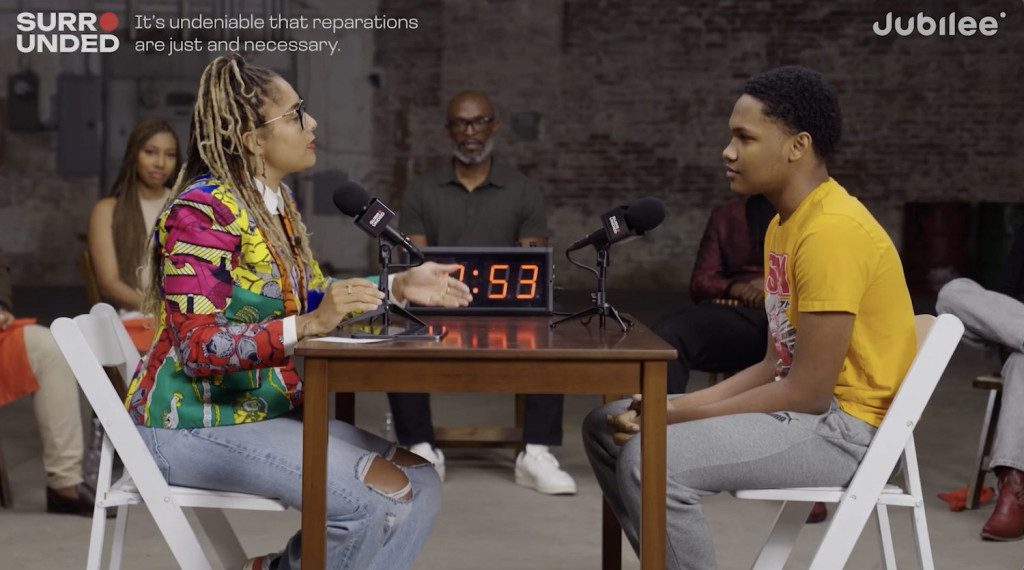Something is jarring about watching someone armed with clarity, conviction, and historical context face off against a room of people lacking all three. In Jubilee’s recent episode of Surrounded, actress and comedian Amanda Seales sat across from 20 Black conservatives to debate reparations, systemic racism, Black-on-Black crime, and more.
What unfolded was less of a debate and more of a cultural lecture, one that demonstrated how deep the erosion of political knowledge and Black historical understanding runs in America’s younger conservative circles.
Seales was in her element; articulate, informed, and unflinching. She challenged every half-truth and rooted her arguments in data, history, and lived experience. But what this episode revealed most is that we are in a crisis of knowledge.
Misinformation is running rampant, especially among young people weaponizing conservatism without understanding its implications or historical roots.
If we are serious about moving forward as a people, we cannot let anecdote replace evidence or vibes replace values. Education, real education about our history, policies, and systems, isn’t just a nice-to-have. It’s the difference between progress and danger.
Seales wasn’t just debating 20 Black conservatives. She was debating decades of erasure, and she did not flinch.
Ignorance Is Not a Strategy
Let’s start with the most disturbing moment: a young man claiming systemic racism doesn’t exist because he “hasn’t experienced it.”
That statement isn’t just naïve, it’s dangerous. It reflects a growing trend where anecdotal privilege is mistaken for collective progress. Seales responded by explaining how systemic racism isn’t about individual feelings but about institutional practices like redlining, disproportionate sentencing, and generational wealth gaps caused by stolen labor and stolen land.
When Seales attempted to discuss how systems like redlining directly impact public education by tying funding to property taxes—a fact—the response from some was disbelief, denial, or outright dismissal.
One man even said redlining “didn’t really exist”. That’s not an opinion; that’s a lack of education.
Reparations: A Debt, Not a Handout
Much of the pushback Seales received on reparations came not from policy critique, but from emotional reactions grounded in bootstraps ideology.
“We believe in hard work,” one participant said, suggesting reparations are for people sitting at home “playing video games and smoking weed.” The problem with this rhetoric is that it divorces reparations from their actual meaning.
Seales clarified the difference between reparations—repairing harm—and remunerations—paying for unpaid labor. This isn’t about charity. It’s about a legal and moral debt owed.
One participant brought up Japanese Americans receiving reparations for internment and questioned why Black Americans should expect the same. Seales pointed out that reparations for Black Americans have never been seriously considered, not because the case isn’t valid, but because this country has always been more invested in Black labor than Black liberation.
“Black-on-Black Crime” as a Misdirection
Repeatedly, participants mentioned “Black-on-Black crime” to deflect from state-sanctioned violence and systemic inequality.
Seales challenged this false equivalency by reminding the group that crime is intraracial across all groups—people hurt those they live around. The notion that Black-on-Black crime disproves systemic oppression is a logical fallacy, and more importantly, it’s a dangerous distraction.
As Seales explained, crime within communities often stems from underinvestment, trauma, and over-policing, not from an inherent moral failing within Black people.
And yet, when one woman shared her personal losses due to community violence, Amanda didn’t dismiss her pain. Instead, she reframed it: we can mourn those losses while still acknowledging the policies and systems that helped shape the environment where those losses occurred.
The Fallacy of Individual Success
Another repeated theme was the “I made it, so anyone can” trope. Participants held up their own degrees and careers as proof that systemic racism doesn’t exist.
But as Seales stressed, “We are not all equal in our trauma… We are not all equal in our capabilities. And we are not all equal in our ability to be invested in by others.” Pointing to Barack Obama or immigrants to claim the system is fair ignores both history and context.
As Seales rightly noted, there’s a big difference between coming to a country as an empowered immigrant and being born into a lineage systematically denied access to wealth, safety, and citizenship.
Check out the full episode below.




